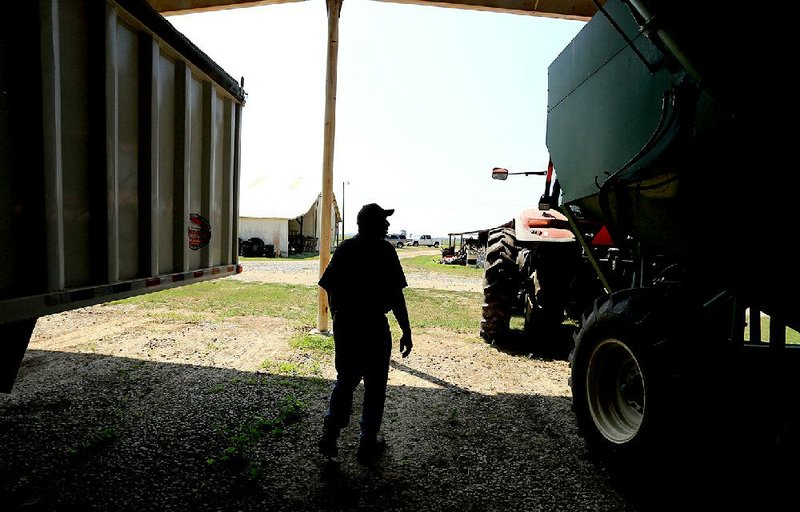BRINKLEY — Gene Depriest munches slowly on an improvised sandwich, a slice of white bread folded over egg salad, as he sits at a table next to the kitchen door.
RELATED ARTICLES
http://www.arkansas…">Turner Grain's leader: Bustedhttp://www.arkansas…">Legislature dropped bill in '91 on licensing for grain dealers
He is waiting for the lunch crowd at the restaurant that bears his name on Main Street.
Business isn’t bad, he says.
But the news is. It’s big and bad.
The town of 3,000 — halfway between Little Rock and Memphis on Interstate 40 — wishes the news would go away. Just as much as it had wished a decade earlier that the news of the day would not.
Millions of dollars of grain — rice, soybeans, corn, wheat and sorghum — have disappeared. Turner Grain Merchandising, whose headquarters is a few blocks south in a small building with a red-brick facade, apparently has collapsed.
In 2004, a video clip appeared to show a phantomish bird, the ivory-bill woodpecker, a species long believed extinct.
It was big news. It was tourism. It was money.
“Man, I’d have two or three tour buses a day,” Depriest said.
Over the entrance of Gene’s Barbecue is a banner: “Welcome to Gene’s Barbecue and Brinkley — Home of the Ivory-Bill Woodpecker.”
Bird business was good. Efforts were made to confirm, legislate and protect the bird.
By 2008, the tourism machine had stalled, says Depriest, 77, who holds court at his table on the events of the day and presides over the restaurant. On one of the knotty-pine walls a large image of the bird is attached, a tentative town symbol.
Stuck on another wall is a sign: “There is no rehab for stupid.”
Agents for the U.S. Agriculture Department shut down, at least temporarily, on Aug. 14 Agribusiness Properties LLC, the storage member of the Turner Grain confederacy.
The agents found no grain in the five, shiny elevators. So they posted a notice at the weigh station.
Turner Grain isn’t been the only bad news around these parts. Terrible rains in late June preceded the revelation.
Dale Oltman sits down at Depriest’s table. He was lucky. He didn’t book anything with Turner. He recounts the rainfall amounts in late June — 20.5 inches east of town, 11 inches in one night.
That’s where the Carroll brothers, Jon and Jim, and four workers farm 3,200 acres.
The official line is that USDA-backed insurance will cover half the loss, Jon Carroll says. Ten percent is more like it, Jim Carroll says. It’s complicated, they agree. Soured business deals leave a bad taste.
One of the principals in Turner Grain, Jason Coleman, said he had “gotten on the wrong side of a position” and had taken a loss in trading, according to testimony in a recent court hearing.
“This is a farm family community,” said Rhonda Carroll, Jim Carroll’s wife. “One of my friends is holding two checks for $400,000” that can’t be deposited. “But you also know the families that run Turner Grain. They’re good people, and it’s heartbreaking from both sides.”
Sitting in an open, airy workshop on Arkansas 238 southeast of Brinkley, the Carroll brothers squeeze an interview into their tight schedule.
They are the fourth generation of the family to work this land. The farm has three workshops. The first was a one-car garage their father converted. The second is much bigger. But a third and even bigger one had to be built to accommodate the row-crop machinery, which continued to get larger. Now the latest models won’t fit into it.
Turner Grain pales in comparison with the giants in the industry: Cargill, Bunge North America, Archer Daniels Midland.
But Tim Spector, president of Tri-County Farmers Association, wonders about the ripple effect in the area.
If the losses amount to $15 million, the multiplier effect — which is a measure of how many times money introduced into a market will “turn over” both directly and indirectly — could increase the burden on the town by tens of millions more, Spector said.
The farmer-owned association has been in business for 56 years, Spector says.
“We’ll weather this, too, in partnership with our growers,” he said.
Spector said there is a “silver lining. We’ve still got crops in the field. If this were Oct. 25, I’d hate to fathom what it would look like.”
Jon Carroll sees things a bit different. The loan payments still must be repaid.
